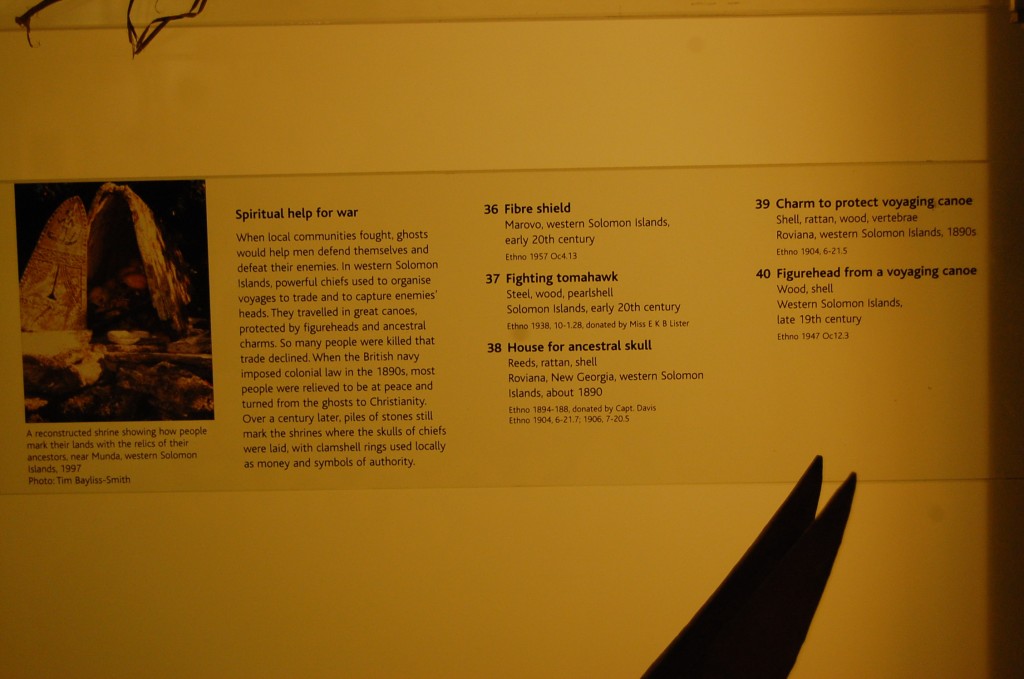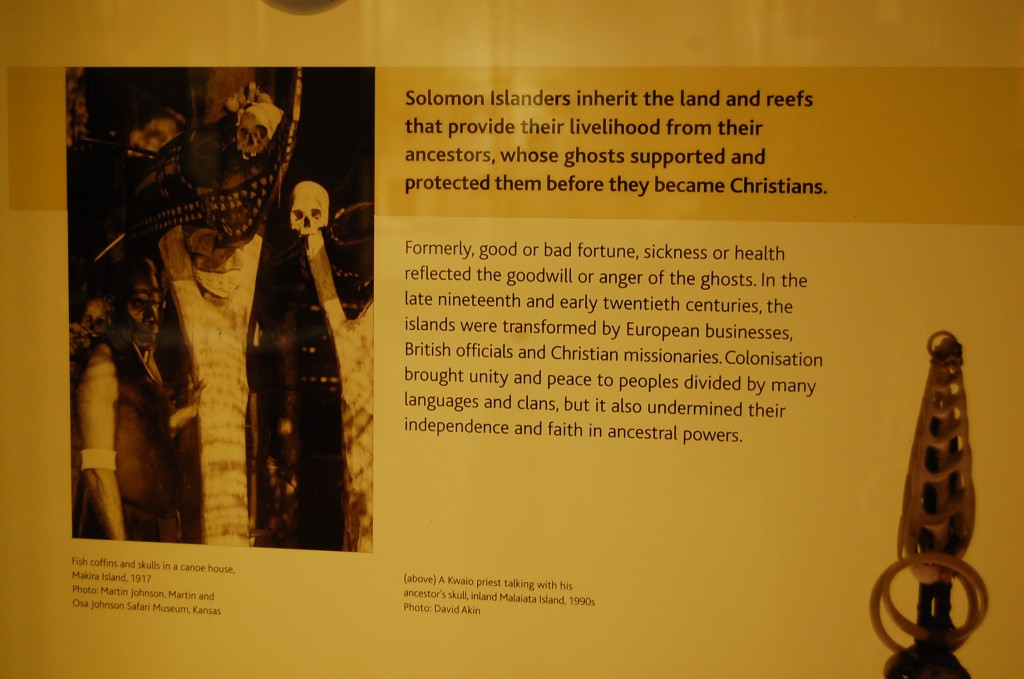 I took the above picture at the British Museum. The text reads:
I took the above picture at the British Museum. The text reads:
When local communities fought, ghosts would help men defend themselves and defeat their enemies. In western Solomon Islands, powerful chiefs used to organise voyages to trade and to capture enemies’ heads. They traveled in great canoes, protected by figureheads and ancestral charms. So many people were killed that trade declined. When the British navy imposed colonial law in the 1890s, most people were relieved to be at peace and turned from the ghosts to Christianity. Over a century later, piles of stones till mark the shrines where the skulls of chiefs were laid, with clamshell rings used locally as money and symbols of authority.
And:

Formerly, good or bad fortune, sickness or health reflected the goodwill or anger of the ghosts. In the later nineteenth and early twentieth centuries, the islands were transformed by European businesses, British officials and Christian missionaries. Colonisation brought unity and peace to peoples divided by many languages and clans, but it also undermined their independence and faith in ancestral powers.
My first reaction: Who is the curator?
Pardon my naivity here – I would presume the curator presented the materials in the language of the day or times hence the imperialistic overtone. However, giving your informed perspective with its implied cultural sensitivity, how would you otherwise have presented the materials?
Regards
Pardon my naivity here – I would presume the curator presented the materials in the language of the day or times hence the imperialistic overtone. However, giving your informed perspective with its implied cultural sensitivity, how would you otherwise have presented the materials?
Regards
Thanks Olu,
If I wanted to present it in the language of the period, I would make it clear that that is what I am doing.
Rgds,
Loomnie.
Thanks Olu,
If I wanted to present it in the language of the period, I would make it clear that that is what I am doing.
Rgds,
Loomnie.
Point taken. Pardon my intrigue here, setting the curator’s oversight aside,how would you otherwise have preferred a more contemporary description? Puzzled by what will pass for a culturally sensitive and accurate description fair to all associated point of views succint enough without having to write a treatise! Hence my intrigue – not a wanton attempt to make heavy weather of an otherwise “innocuous” subject matter – as I’m sure you’ll agree, there is nothing simple about cultural matters!
Point taken. Pardon my intrigue here, setting the curator’s oversight aside,how would you otherwise have preferred a more contemporary description? Puzzled by what will pass for a culturally sensitive and accurate description fair to all associated point of views succint enough without having to write a treatise! Hence my intrigue – not a wanton attempt to make heavy weather of an otherwise “innocuous” subject matter – as I’m sure you’ll agree, there is nothing simple about cultural matters!
Olu,
Yea, you are certainly right about how complicated cultural matters are. I don’t think there is a need to look for a accurate and timeless explanation of the pictures. Why not simply mention where the objects in the pictures are from and what they were used for? Why add the extra explanatory layer of how the people were united because of colonisation? It is when you enter that field that you need to write a treatise.
Rgds,
Loomnie.
Olu,
Yea, you are certainly right about how complicated cultural matters are. I don’t think there is a need to look for a accurate and timeless explanation of the pictures. Why not simply mention where the objects in the pictures are from and what they were used for? Why add the extra explanatory layer of how the people were united because of colonisation? It is when you enter that field that you need to write a treatise.
Rgds,
Loomnie.
I suppose this is one where context is key. Perhaps as a collection where the role of the Navy, and how those objects came into their possession had to be explained or justified, there was a need to go beyond the where and what but also the how, when, and by whom. I doubt if there is ever such a thing as an objective description or representation of anything, never mind cultural views! Subjective nuances will always be manifested linguistically, visually etc dependent on the point of view.
Ambivalent about the role of the curator in this piece given the historical context, I reckon bland objectivity denies the necessary insight of underlying themes, afterall museums can only form a part of a knowledge base and not the full complement. Does this mean I favour Christianity and colonisation as civilising forces in this instance? Not necessarily but there was a context and a associated rationale.
As a piece in the British Museum, a certain element would be missing without that certain perspective. I wonder how the locals would view the pieces? Especially the discerning views from the victors and victims of the local conflicts!
Good work on Nigerians Talk by the way! Very informing! Keep up the good work.
I suppose this is one where context is key. Perhaps as a collection where the role of the Navy, and how those objects came into their possession had to be explained or justified, there was a need to go beyond the where and what but also the how, when, and by whom. I doubt if there is ever such a thing as an objective description or representation of anything, never mind cultural views! Subjective nuances will always be manifested linguistically, visually etc dependent on the point of view.
Ambivalent about the role of the curator in this piece given the historical context, I reckon bland objectivity denies the necessary insight of underlying themes, afterall museums can only form a part of a knowledge base and not the full complement. Does this mean I favour Christianity and colonisation as civilising forces in this instance? Not necessarily but there was a context and a associated rationale.
As a piece in the British Museum, a certain element would be missing without that certain perspective. I wonder how the locals would view the pieces? Especially the discerning views from the victors and victims of the local conflicts!
Good work on Nigerians Talk by the way! Very informing! Keep up the good work.
Olu I hear you, but I completely disagree. Museums by their very nature do not offer context for the exhibits, only context for their own agenda.
The British Museum (with whom I have a very passionate love hate relationship) was founded on pro-colonialism, they have no interest in objectivity even if they could, like Loomnie said, just present the facts.
I haven’t seen the exihibit myself, but I’d guess there is no mention of the extremely bloody way in which colonial masters and missionaries brought their so called peace and civilisation.
We don’t need to make excuses for them to live amongst them. Call a spade a spade and lets not put cotton wool on a knife wound to the heart.
Olu I hear you, but I completely disagree. Museums by their very nature do not offer context for the exhibits, only context for their own agenda.
The British Museum (with whom I have a very passionate love hate relationship) was founded on pro-colonialism, they have no interest in objectivity even if they could, like Loomnie said, just present the facts.
I haven’t seen the exihibit myself, but I’d guess there is no mention of the extremely bloody way in which colonial masters and missionaries brought their so called peace and civilisation.
We don’t need to make excuses for them to live amongst them. Call a spade a spade and lets not put cotton wool on a knife wound to the heart.
It seems to me factually incorrect to state that “colonization brought unity and peace.” Certainly this was not the case in West Africa, where the colonial government undermined tribal authority in order to fashion economically dependent colonies. Where the only authority was based upon achieved status, hostilities may perhaps have declined. I do not believe there is any reliable data on the incidence of warfare prior to colonization, however.
It seems to me factually incorrect to state that “colonization brought unity and peace.” Certainly this was not the case in West Africa, where the colonial government undermined tribal authority in order to fashion economically dependent colonies. Where the only authority was based upon achieved status, hostilities may perhaps have declined. I do not believe there is any reliable data on the incidence of warfare prior to colonization, however.